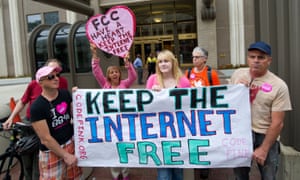
Activists are joining forces with the biggest tech firms to fight on behalf of net neutrality.
Photograph: Karen Bleier/AFP/Getty Images
Net neutrality
Trump’s ‘war on the open internet’: tech firms join day of action for net neutrality
Amazon, Facebook and Netflix among companies demonstrating on behalf of net neutrality, in what supporters say will be biggest online protest in history
Amazon, Facebook, Netflix and a host of other tech giants will join with online activists, librarians, minority rights and free speech groups today in a day of protest against the Trump administration’s plans to roll back rules in what critics charge is a “war on the open internet”.
The “day of action” – which supporters claim will be the largest online protest in history – comes as the new head of the Federal Communications Commission (FCC), the US telecoms and media watchdog, prepares to defang tough rules protecting internet access in the US following pressure from cable companies and other internet service providers (ISPs).
Quick Guide
Net neutrality

Net neutrality is the idea that internet service providers (ISPs) treat everyone’s data equally – whether that’s an email from your mother, a bank transfer or a streamed episode of The Handmaid’s Tale. It means that ISPs don’t get to choose which data is sent more quickly, and which sites get blocked or throttled (for example, slowing the delivery of a TV show because it is streamed by a video company that competes with a subsidiary of the ISP) and who has to pay extra. For this reason, some have described net neutrality as the “first amendment of the internet”.
In February 2015, the Federal Communications Commission (FCC) voted to more strictly regulate ISPs and to enshrine in law the principles of net neutrality. The vote reclassified wireless and fixed-line broadband service providers as title II “common carriers”, a public utility-type designation that gives the FCC the ability to set rates, open up access to competitors and more closely regulate the industry. Two years on, Trump’s new FCC chairman, Ajit Pai, a former Verizon lawyer, has pushed to overturn the 2015 order. On 18 May, the FCC voted to support a new proposal that would repeal the order and started a 90-day period in which members of the public could comment. The deadline for feedback is 17 July, after which the FCC has to provide reply comments by 16 August, before a final vote later in the year.
Evan Greer, campaign director of Fight For the Future, the not-for-profit group organizing the day of action, said the protest came at a critical moment for the internet. “The internet has had a profoundly democratizing impact on our society. If we lose these protections, then we will lose all that diversity,” she said.
The FCC chairman, Ajit Pai, is a longtime critic of the 2015 “open internet” rules which he has called politically motivated and “heavy handed” and has claimed stifle innovation by imposing unnecessary burdens on cable companies. Those rules have been unsuccessfully challenged in the US courts but could now be overturned by the Republican-controlled FCC.
In May, the FCC voted two to one to start the formal process of dismantling “net neutrality” rules that prevent ISPs from creating fast lanes (or slow lanes) that could favor one service over another and potentially allow them to choose winners and losers online.
Pai has called his proposed rule-making “Restoring Internet Freedom”.
The move has already sparked a huge online backlash, with more than 5.6m comments submitted to the FCC. So many comments were submitted to the FCC after the comedian John Oliver attacked Pai’s opinions that its comment system collapsed and the regulator has been flooded with fake comments from “people” in support of the weakened rules.
But Pai has remained steadfast in his commitment to roll back the measures: “Make no mistake about it: this is a fight that we intend to wage and it is a fight that we are going to win,” he said in a speech in April.
Alongside the tech companies, pressure groups and activists including the American Library Association, ACLU, Free Press, Greenpeace and National Hispanic Media Coalition will all champion their support of the current rules today and press their followers to write to the FCC and their members of Congress to stop Pai overturning them.
“Ajit Pai has made it clear that he doesn’t care what millions of people have to say or to listen to the voices of the leading technology companies in the world. That said Ajit Pai answers to Congress and Congress will soon be well aware that people from acrioss the political spectrum overwhelmingly support the current rules,” said Greer.
Another supporter, the Writers Guild of America, has called the move a “war on the open internet”.
Pai’s proposals have attracted fierce criticism from Democrats, too. In a letter to Pai sent last month, the House minority leader, Nancy Pelosi said she was “dismayed” that Pai had chosen to ignore the millions of public comments filed in support of the FCC’s current rules.
“Consumers should be able to use the internet on the device they want, using the apps and services they want, without their internet provider standing in the way,” says Pelosi. “I support the current rules because they are in place to protect consumers, and I oppose your efforts to eliminate them.”
Global tech companies including Google, Netflix and Twitter joined a similar day of protest in 2014 that helped push the FCC to reclassify broadband under Title II of the Telecommunications Act, a move that regulates the internet service ISPs provide in a way similar to how it regulates access to the telephone.
Comments on the FCC’s new proposal will be open until August and an as yet unscheduled vote is expected later this year.